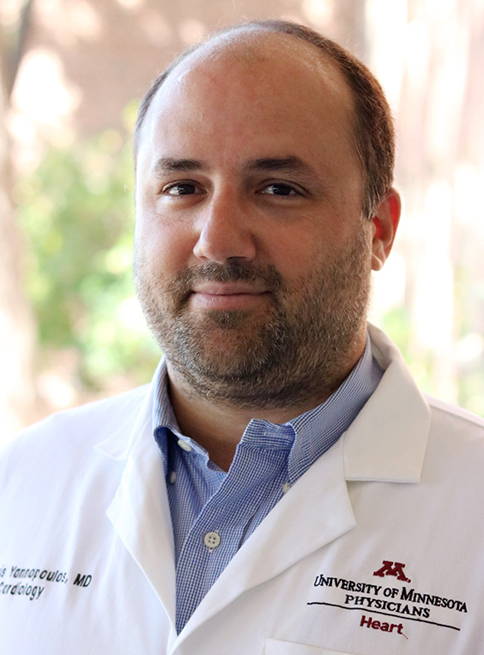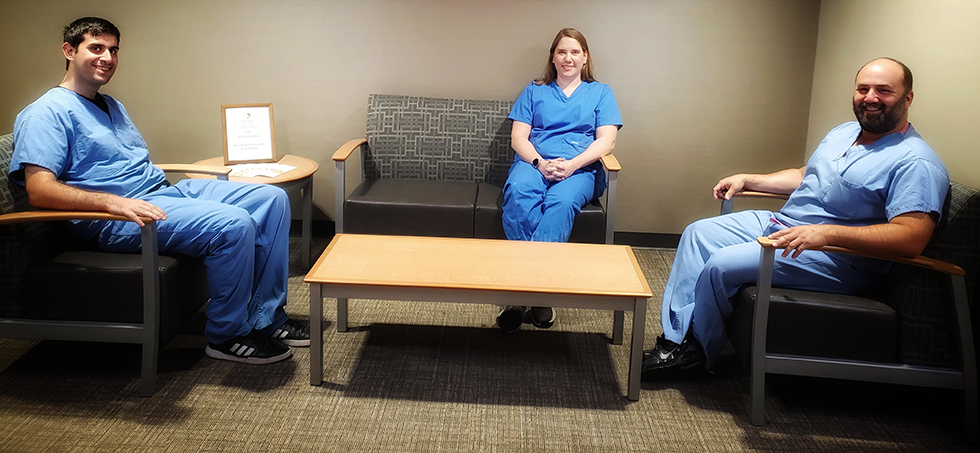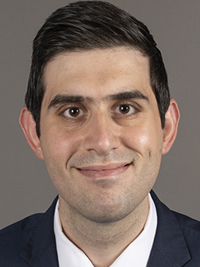Yannopoulos Lab

Dr. Yannopoulos' lab is a pioneering and diverse group of collaborators that focuses on the management of cardiac arrest, the leading cause of mortality in the United States. Through a model of refractory cardiac arrest, we have managed to shift gears in cardiac arrest management through revolutionary approaches; such as, the impedance threshold device, extracorporeal cardiopulmonary membrane oxygenation (ECMO), and sodium nitroprusside. These approaches have successfully been transferred from bench to patient with multiple clinical trials, both completed and ongoing. Recently, our lab has been leading a multi-institutional effort to personalize cardiopulmonary resuscitation (CPR) delivery through application of machine learning algorithms to optimize CPR parameters.
Another critical part of our mission is myocardial recovery following ischemic insults, most notably myocardial infarction. To approach recovery, our laboratory has studied extensively the role of mitochondria following myocardial infarction and has successfully reduced infarct size through administration of polymer P188. Novel products are currently being tested and the hemodynamic parameters of recovery are actively researched.
Our lab incorporates a culture of collaboration, diversity, openness, and innovation as the cornerstones of our drive to discover. With these principles in mind, we keep pursuing our mission, aiming to further advance the understanding of cardiac arrest and, ultimately, improve survival and clinical outcomes.
"Effect of Adjusting Compression Depth During CPR on Coronary Perfusion Pressure"
Developing techniques to enhance cardiopulmonary resuscitation (CPR) are of vital importance to increase survival outcomes from cardiac arrest. A primary challenge of CPR is to ensure adequate blood flow to the brain and heart. Through adjusting depth of chest compressions during ongoing CPR, an optimal compression depth could be achieved that maximizes coronary perfusion pressures and thus perfusion to both of these organs.
"Assessment of the Effect of Cortisol Administration on Hemodynamic Response to Vasopressors at the Time of ECMO Cannulation"
According to the 2015 Institute of Medicine report Strategies to Improve Cardiac Arrest Survival: A Time to Act, approximately 395,000 people suffer an out-of -hospital cardiac arrest (OHCA) each year in the United States. The survival rate is 6% to 10%, resulting in >350,000 deaths per year, making sudden cardiac arrest virtually syononymous with sudden cardiac death. Recent advancements in the in-hospital care of patients have resulted in marked increase of patient survival, with extracorporeal membrane oxygenation (ECMO) being one of the most successful novel adaptations. However, while return of spontaneous circulation rates has increased, maintenance of adequate tissue perfusion after hospital admission is still limited due to the profound vasoplegia that occurs after OHCA.
OHCA patients have been noted to have a relative cortisol deficiency, while there is also profound vasoplegia. The aim of this research is to identify whether cortisol administration reverses this deficiency and improves blood pressure regulation and response to norepinephrine.
"Targeted Membrane Integrity in Cardiac Ischemia and Reperfusion"
Myocardial ischemia occurs when the blood flow to the heart is reduced as a result of a partial or complete blockage of the coronary arteries. Reperfusion injury can result after the blockage is removed and blood flow is restored. The mechanism of myocardial ischemia/reperfusion (I/R) injury is not completely understood and is an important aspect for the treatment of coronary heart disease.
Results from this study will provide new insights for the treatment of coronary heart disease with cellular membrane stabilizers.
Bartos, J. A., & Yannopoulos, D. (2020). Refractory cardiac arrest: where extracorporeal cardiopulmonary resuscitation fits. Current opinion in critical care, 10.1097/MCC.0000000000000769. Advance online publication. https://doi.org/10.1097/MCC.0000000000000769
Kosmopoulos, M., Roukoz, H., Sebastian, P., Kalra, R., Goslar, T., Bartos, J. A., Yannopoulos, D., & Benditt, D. G. (2020). Increased QT Dispersion Is Linked to Worse Outcomes in Patients Hospitalized for Out-of-Hospital Cardiac Arrest. Journal of the American Heart Association, 9(16), e016485. https://doi.org/10.1161/JAHA.120.016485
Yannopoulos, D., Kalra, R., Kosmopoulos, M., Walser, E., Bartos, J. A., Murray, T. A., Connett, J. E., & Aufderheide, T. P. (2020). Rationale and methods of the Advanced R2Eperfusion STrategies for Refractory Cardiac Arrest (ARREST) trial. American heart journal, 229, 29–39. Advance online publication. https://doi.org/10.1016/j.ahj.2020.07.006
Kalra, R., Bartos, J. A., Kosmopoulos, M., Carlson, C., John, R., Shaffer, A., Martin, C., Raveendran, G., & Yannopoulos, D. (2020). Echocardiographic evaluation of cardiac recovery after refractory out-of-hospital cardiac arrest. Resuscitation, 154, 38–46. https://doi.org/10.1016/j.resuscitation.2020.06.037
Kalra, R., Kosmopoulos, M., Goslar, T., Raveendran, G., Bartos, J. A., & Yannopoulos, D. (2020). Extracorporeal cardiopulmonary resuscitation for cardiac arrest. Current opinion in critical care, 26(3), 228–235. https://doi.org/10.1097/MCC.0000000000000717
Kosmopoulos, M., Bartos, J. A., Kalra, R., Goslar, T., Carlson, C., Shaffer, A., John, R., Kelly, R., Raveendran, G., Brunsvold, M., Chipman, J., Beilman, G., & Yannopoulos, D. (2020). Patients treated with venoarterial extracorporeal membrane oxygenation have different baseline risk and outcomes dependent on indication and route of cannulation. Hellenic journal of cardiology : HJC = Hellenike kardiologike epitheorese, S1109-9666(20)30081-6. Advance online publication. https://doi.org/10.1016/j.hjc.2020.04.013
Ripeckyj, A., Kosmopoulos, M., Shekar, K., Carlson, C., Kalra, R., Rees, J., Aufderheide, T. P., Bartos, J. A., & Yannopoulos, D. (2020). Sodium Nitroprusside-Enhanced Cardiopulmonary Resuscitation Improves Blood Flow by Pulmonary Vasodilation Leading to Higher Oxygen Requirements. JACC. Basic to translational science, 5(2), 183–192. https://doi.org/10.1016/j.jacbts.2019.11.010
Bartos, J. A., Grunau, B., Carlson, C., Duval, S., Ripeckyj, A., Kalra, R., Raveendran, G., John, R., Conterato, M., Frascone, R. J., Trembley, A., Aufderheide, T. P., & Yannopoulos, D. (2020). Improved Survival With Extracorporeal Cardiopulmonary Resuscitation Despite Progressive Metabolic Derangement Associated With Prolonged Resuscitation. Circulation, 141(11), 877–886. https://doi.org/10.1161/CIRCULATIONAHA.119.042173
Duval, S., Pepe, P. E., Aufderheide, T. P., Goodloe, J. M., Debaty, G., Labarère, J., Sugiyama, A., & Yannopoulos, D. (2019). Optimal Combination of Compression Rate and Depth During Cardiopulmonary Resuscitation for Functionally Favorable Survival. JAMA cardiology, 4(9), 900–908. https://doi.org/10.1001/jamacardio.2019.2717
Bartos, J. A., Carlson, K., Carlson, C., Raveendran, G., John, R., Aufderheide, T. P., & Yannopoulos, D. (2018). Surviving refractory out-of-hospital ventricular fibrillation cardiac arrest: Critical care and extracorporeal membrane oxygenation management. Resuscitation, 132, 47–55. https://doi.org/10.1016/j.resuscitation.2018.08.030


Marinos Kosmopoulos, M.D.
Post-doctoral Research Fellow
Education: 2017, M.D., University of Athens, School of Medicine
Research Interests: Resuscitation, Extracorporeal Life Support, Mortality Risk Prediction/Stratification, Ischemic Preconditioning

Danielle Burroughs
Lab Manager
Education: 2000, B.S. in Zoology, Iowa State University